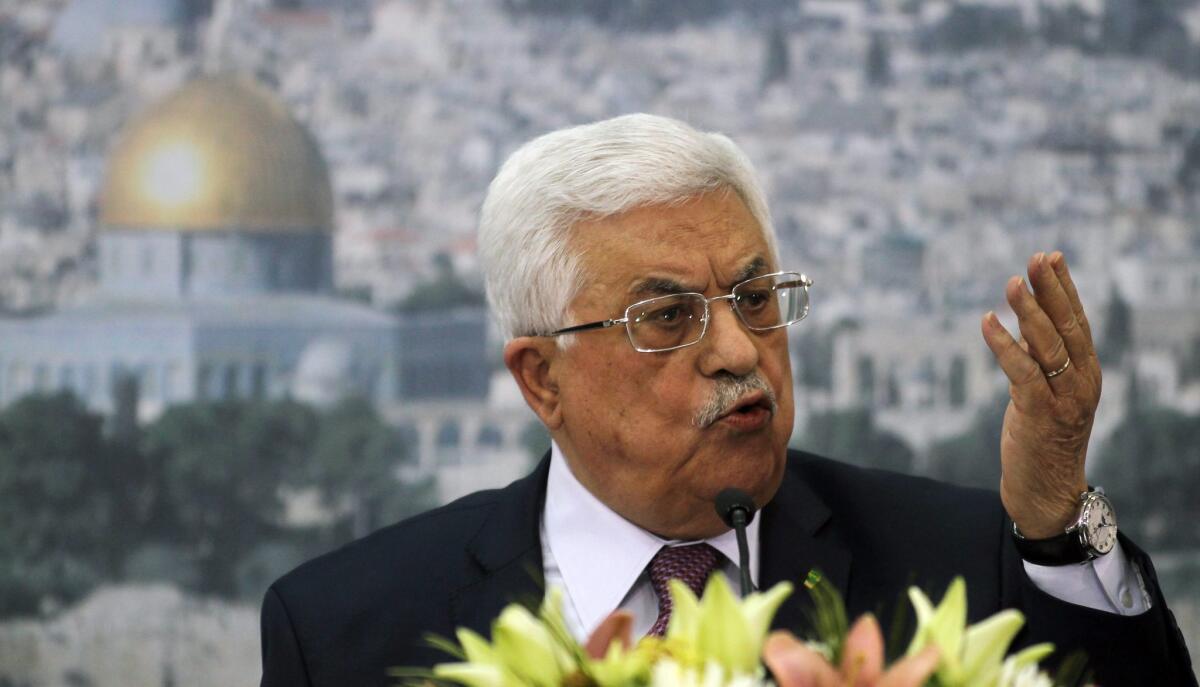If Mao and Chiang Kai-shek could defer core issues, so can Israel and the Palestinians

Israelis and Palestinians are facing their most difficult negotiation since Menachem Begin flew west to face Egyptian President Anwar Sadat a generation ago at Camp David. If Israel were to end its long occupation, if Palestinians were to unite and forswear violence, if two states were able to share an eternal capital in Jerusalem and bind up the wounds of their long enmity, then a viable Palestinian state could emerge to live in peace with its most prominent and powerful neighbor.
Sadly, the final hurdles that diplomats, chief among them Secretary of State John F. Kerry, face in organizing a new negotiation are shaped by preconditions. One of the most nettlesome is Israel’s demand that the Palestinians recognize Israel as a Jewish state. Prime Minister Benjamin Netanyahu, speaking in Jerusalem to the presidents of Jewish organizations last week, said: “The Palestinians expect us to recognize a nation state for the Palestinian people. How do they have the temerity not to recognize the Jewish state, the nation state of the Jewish people?”
Of course, the Palestinians have recognized the state of Israel during negotiations under prime ministers Yitzhak Rabin, Ehud Barak and Ehud Olmert, in which both sides recognized the legitimacy and aspirations of the other. For what other purpose were Rabin and Yasser Arafat shaking hands on the White House lawn? Palestinians claim that to recognize Israel as a Jewish state dehumanizes the more than 1 million Arab Israelis, as well as Christians and other minorities, who are counted as citizens of Israel. Netanyahu may have erected this demand to block any return to the negotiating table.
But for those interested in moving forward, it seems a worthy exercise to try to satisfy this requirement.
The Israeli-Palestinian conflict is not the first or the most intractable faced by Western diplomacy. In 1972, the question of Taiwan stood in the way of a Sino-American rapprochement. But President Nixon overcame the towering enmities between the Chinese civil war rivals — Mao Tse-tung and Chiang Kai-shek — who had fought to a standstill over who should rule China and whose armies still faced each other across the narrow Taiwan Strait.
In that negotiation, as in the Holy Land today, there was a fierce battle over definitions. Mao’s mainland government insisted on stating that “the People’s Republic of China is the sole legal government of China… [and] the liberation of Taiwan is China’s internal affair.”
But the able diplomats on the U.S. negotiating team proposed language for a joint Washington-Beijing declaration that became the operative component of what we call the Shanghai Communique: “The U.S. acknowledges that all Chinese on either side of the Taiwan Strait maintain there is but one China.”
Following this declaration in February 1972, all sides eventually agreed to defer the core issues of the conflict so as to begin a dialogue on how they might one day come together, opening the lines of communication, trade and investment across the strait, all of which has been knitting the Chinese people back together in a web of constructive interaction. There are still many problems across the strait, but Nixon’s achievement, enabled by creative diplomacy, opened a new chapter in Asia.
For Israelis and Palestinians, a version of the Shanghai formula, orchestrated by the U.S. and other Western nations, could address Netanyahu’s concerns by allowing him and his Palestinian partner, Mahmoud Abbas, to state their views of history, while adhering to these truths: that both sides agree there is one Israel and one Palestine; that Israel is the national homeland for the Jewish people, and for the indigenous Arabs, Christians and other minorities who count as its citizens; that Palestine is the national homeland of the Palestinian people, including Arabs, Christians and others who will be its citizens.
Further, Israelis recognize the Palestinian state with the understanding that it is the right of its citizens to define its national character. Likewise, Palestinians recognize the state of Israel and that it is for the Israelis to define their national character. Neither side should interfere in the internal affairs of the other in this process.
Netanyahu may not fully agree with such a formulation, but the task of creative diplomats will be to find the means for political expression with which each leader can defend the historical narrative and definitions of domestic constituencies.
The genius of the Shanghai Communique was that it deferred the red-hot issues of war and legitimacy to an unspecified future. Taiwan initially denounced the document as an American sellout and a surrender to “Red” China. But its leaders came around to the wisdom of engaging its mainland rival on trade, commerce and investment as long as the U.S. guaranteed the island’s security by selling Taiwan defensive arms.
Deferral is the key ingredient for Middle East peace. Let both sides recognize each other as states, and leave the full expression of national character and the future to its citizens, where it belongs.
Patrick Tyler, a journalist, is the author of “A Great Wall,” a history of U.S.-China relations; “A World of Trouble,” a history of U.S. diplomacy in the Middle East; and “Fortress Israel.”
More to Read
A cure for the common opinion
Get thought-provoking perspectives with our weekly newsletter.
You may occasionally receive promotional content from the Los Angeles Times.






